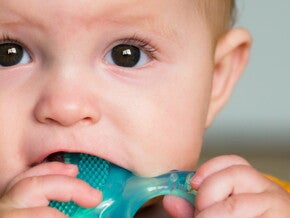
Vomiting
Possetting
Providing there is good weight gain, it is quite normal and common for newborn babies to bring up small amounts of milk after a feed. The valve at the top of the stomach is not fully developed and allows the return of a little milk – this stops as the valve develops. Possetting is normal up to the age of nine months.
- Don’t burp him too vigorously and keep him upright for about 20 minutes before putting him down to sleep.
- Raise the head of the mattress by placing a folded towel underneath it.
Projectile vomiting
- If persistent projectile vomiting occurs, consult your doctor.
A baby who vomits after feeds but remains a thriving happy child, gaining weight regularly, is doing well. Don’t worry – just protect his and your clothes!
Consult your doctor if your baby seems unwell, especially if the vomiting is accompanied by diarrhoea or a fever.
NOTE: Check your baby’s weight regularly as this will tell you if he is thriving.
Related articles

The Apgar score
Apgar:
A system of evaluating a newborn’s physical condition by assigning a score (0,1, 2) to each of the following criteria:
5 mins to read

Breastfeeding Videos
A Breastfeeding experience which is enjoyable and beneficial to both mom and baby depends on a relaxed, well-nourished mother who approaches this experience positively and with confidence.&nb
5 mins to read

Foundation of life
Breastmilk is uniquely designed for each individual baby!
5 mins to read

Possible problems
If you are ever concerned about your baby’s health, behaviour or development, consult your doctor or clinic sister. It is better to be safe than sorry.
5 mins to read

Rashes
A young baby’s skin passes through many phases, from clear to spotty (rash), to peach-like. This may be due to the transition from a protected environment in the womb to the outside world.
5 mins to read

Sleeping
Babies all have individual temperaments, which will affect their sleep patterns. Some are sleepy and others more alert and wakeful.
5 mins to read

Immunisation
The aim of immunisation is to prevent disease. It protects the community as well as individuals.
5 mins to read

Crying
A new baby cries a great deal of the time. It is her only way of communicating. It is difficult at first to know why she cries, but your ability to interpret her cries will improve with time.
5 mins to read

Bathing
Use your hospital stay to learn how to bath your baby. Babies usually have their first bath about an hour after birth.
5 mins to read

Clinics and postnatal support
Clinics and primary health services are freely available in most countries in Southern Africa. Locate your closest clinic and the telephone number from your local authority or hospital.
5 mins to read


Schedule and routines
Routines are difficult to establish with a new baby. You may feel as if your life revolves around the insatiable needs of your baby.
5 mins to read

Returning to Work From Maternity Leave
Taking care of a newborn baby is a full time job which requires dedication from you and your family.
4 mins to read

Becoming a parent
Becoming a parent is full of Excitement
The first six to eight weeks after your baby’s birth is known as the post-partum period, a time of physical and emotional readjustment.
1 min to read

Weight gain
Birth weight depends on several factors, including the mother’s nutritional status and genetic disposition. The average weight for a newborn is around 3,3 kg.
5 mins to read

Don’t forget your support system
An action plan for your family and friends.
5 mins to read

Breastfeeding – Foundation of life
Nestlé Start Strong Stay Strong aims to provide support to encourage your breastfeeding journey.
5 mins to read

My newborn
Parent-infant interaction
Interaction with your baby begins before she is born. You usually feel life at about 20 weeks into pregnancy as light, fluttering sensations.
5 mins to read

Teething
First teeth! Consult your dentist about fluoride for your child’s teeth. Until a child learns to brush his teeth, the mother must clean them for him.
5 mins to read